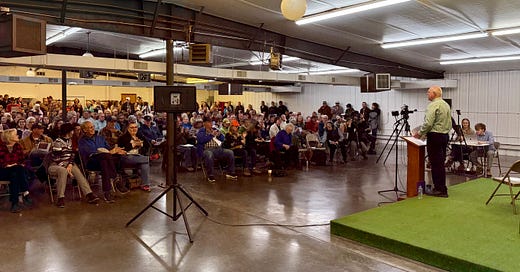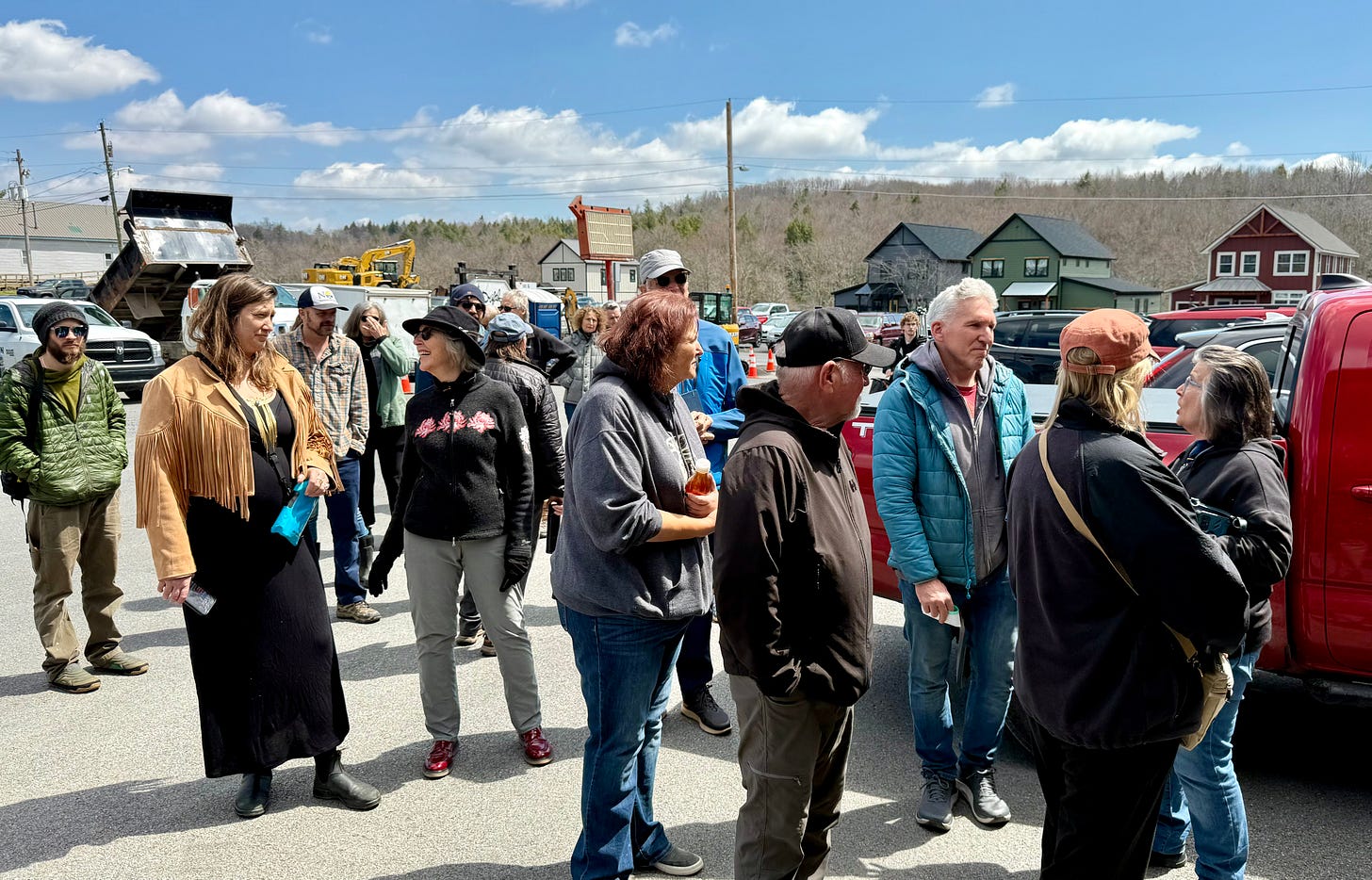Data Center Plan Draws Fierce Opposition
Public meeting yields outpouring of concern about pollution, secrecy, loss of local control
About 275 people packed into the Davis fire hall on Sunday to express concerns that a proposed power plant and data center nearby would yield few family-supporting jobs while producing enormous amounts of air, water, noise, and light pollution.
Many in the standing-room-only crowd said they are upset that none of their elected representatives in the West Virginia state legislature, nor any of the businesspeople behind the project, showed up to answer questions and hear their concerns. (An additional 100 or so people joined the meeting via a video link.)
Steven Leyh, executive director of the Tucker County Development Authority, said that good corporate leaders “don’t shove things down your throat.”
Leyh added that the right kind of project could be good for the area, but more information and dialogue are needed. “You as a community need to speak your mind, and Charleston needs to listen,” said Leyh, drawing a robust round of applause from the audience.
Nobody voiced outright support for the project. Most expressed views ranging from deep concern to adamant opposition.
The West Virginia legislature on Saturday passed a “microgrid” bill, HB 2014, that would facilitate the construction of data centers with their own on-site power generators by blocking the ability of local governments to regulation them. Gov. Patrick Morrisey is expected to sign the bill.
One such facility has been proposed for Tucker County, between Davis and Thomas.
People at Sunday’s meeting directed much of their anger at Randy Smith, who represents Tucker County in the state Senate and voted for the bill. Smith is also the president of the Senate, giving him added clout in Charleston. When informed that Smith would not attend the meeting, a chorus of “boo” rose from audience.
Of all who spoke at the meeting, County Commission President Mike Rosenau was perhaps the most supportive of the project. Rosenau told the crowd that he doesn’t like the site chosen for the proposed data center, but he added that Tucker County needs to expand its job base beyond the tourism industry.
Rosenau also said he was concerned that too much local pushback against state lawmakers might diminish the county’s clout in Charleston.
At that point an audience member shouted, “So you’re afraid?”
Rosenau replied, “I’m not afraid of shit. That’s the bottom line. I’m just being realistic,” and abruptly walked off the stage.
Additional stories on this topic:
County Commissioner Fred Davis compared the data center proposal to the Hyperloop high-speed transportation project, saying it would never happen and that the issue was needlessly dividing the community.
“Multiple” data centers
Davis Mayor Al Tomson, who organized Sunday’s meeting, said local leaders across the state are “pretty upset” that the state legislation blocks any local control of microgrid-powered data centers. “That really demonstrates, unfortunately, how much Charleston values local opinion,” Tomson said.
Tomson and others at the meeting expressed hope that public pressure might force state lawmakers to backtrack in the next legislative session.
The power plant proposed for Tucker County would generate so much electricity that it likely is intended to run “multiple” data centers, Tomson said.
A secretive Virginia company called Fundamental Data recently filed a permit application for the project with the air quality division of the West Virginia Department of Environmental Protection. The company said it obtained the rights to purchase property adjacent to the Tucker County landfill for the project. That property currently is owned by Western Pocahontas Properties.
“I talked to Western Pocahontas,” Tomson said. “Not surprisingly, they are under a nondisclosure agreement.”
Tomson said he also invited Casey Chapman of Fundamental Data to attend the meeting. “He said he would think about it,” Tomson said, drawing snickers from the crowd.
Tomson said that Chapman told him people are overreacting to the proposal.
Good jobs?
Many people at the meeting questioned claims that the data center would create many family-supporting jobs for locals. Tomson estimated the data center would employ 15 to 20 people, and the power plant might employ 25 to 30 people.
Some in the audience said that many of those jobs might be relatively low-paying positions for janitorial and security services. Others speculated that many of the top-paying jobs would go to outsiders with data center experience, or they could be performed remotely. Workers for the construction phase might also be predominantly non-local, audience members said.
Tomson said he planned to seek meetings with the governor and Senate President Randy Smith to share the community’s concerns. He said he’s also working on a petition drive.
People at the meeting were urged to share their thoughts on the project by contacting the state Department of Environmental Protection at 304-926-0499, ext. 41281; or Jerry Williams at Jerry.Williams@wv.gov or 304-414-1214.
Secrecy at issue
Many audience members said their concerns about the project are amplified by the fact that large portions of the permit application are redacted, citing “confidential business information,” as well as the haste with which the microgrid legislation moved through the statehouse.
As originally proposed, the bill would have redirected all new property tax revenue generated by data centers to the state. Local officials raised objections to that provision, and the legislation was subsequently amended.
The final version of the bill allows counties to keep 30 percent of new property tax revenue generated by data centers, with another 10 percent distributed to counties on a per-capita basis. Other local jurisdictions, including local schools, would get none of the new property taxes generated by data centers.
The remaining 60 percent of new property tax revenue generated by data centers would go to the state for a personal income tax reduction fund and other purposes.
Pollution concerns
Pollution was on the minds of many at Sunday’s meeting. Marilyn Shoenfeld, president of the West Virginia Highlands Conservancy, noted that the permit says 30 million gallons of diesel fuel would be stored on-site. She said the prospect of that much flammable liquid stored so close to Davis Thomas Elementary Middle School was “terrifying.”
Speakers at the meeting also noted that data centers need huge volumes of water for cooling, and they wondered about the impact on local aquifers, especially in light of the water crisis that affected the area amid last year’s drought.
Other speakers cited the huge amounts of air pollutants that would be generated at the facility.
Tucker County resident Nikki Forrester worried about the impact of around-the-clock noise pollution, saying data centers “sound like a jet plane that’s never going to take off.”
“I know we need more jobs,” Forrester said, her voice breaking with emotion. “I know we need money. But this is not the way.”







Magnificent reporting and fast turnaround.
Great job (again), Dan. You are hitting it out of the park with your series on this issue. Thank you.